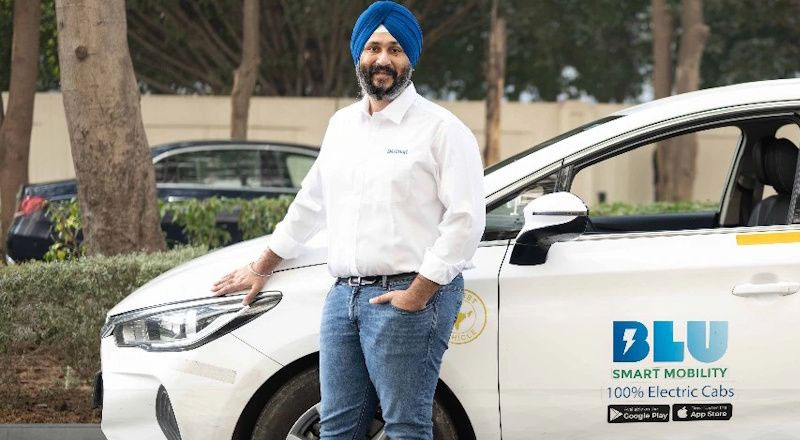The Rise of BluSmart
Launched in 2019, BluSmart emerged as India’s first all-electric ride-hailing platform, offering an eco-friendly alternative to traditional cab services. Backed by clean mobility ambitions and investor enthusiasm, BluSmart quickly scaled operations across Delhi-NCR, Mumbai, and Bengaluru. The company positioned itself as a green disruptor in a space dominated by Ola and Uber, with promises of zero surge pricing, courteous drivers, and a climate-conscious fleet.
But that promising trajectory came crashing down in April 2025, as the platform abruptly suspended operations following a damning order from the Securities and Exchange Board of India (SEBI). At the heart of the controversy are financial irregularities involving BluSmart’s co-founders, who are also linked to Gensol Engineering—an energy and infrastructure firm under intense regulatory scrutiny.
SEBI’s Interim Order Triggers Collapse
On April 15, SEBI released a scathing interim order against Gensol Engineering, citing serious financial misconduct by its promoters—Anmol Singh Jaggi and Puneet Singh Jaggi, both of whom co-founded BluSmart. The order bars the brothers from participating in capital markets and holding executive roles, leading to an immediate fallout across their ventures.
BluSmart swiftly halted cab services in Delhi-NCR, Bengaluru, and Mumbai, with users unable to book rides through the app. Passengers stranded at airports and city locations took to social media, posting screenshots of the company’s notification: “We’ve decided to temporarily close bookings on the BluSmart app… If services do not resume within 90 days, we will initiate a wallet refund.”
The sudden operational freeze follows BluSmart’s failed attempt to raise ₹415 crore (~$50 million)—a move derailed largely due to the reputational hit Gensol has taken. The result: investor confidence plummeted, and the financial cushion needed to sustain monthly operating costs of over ₹20 crore evaporated.
Cracks in Governance: SEBI’s Findings on Gensol
According to SEBI, the Jaggi brothers misused company funds for personal luxury expenses. The interim order details extravagant purchases, including a ₹26 lakh golf set and a high-end apartment at DLF Camellias in Gurgaon, calling it a “complete breakdown of corporate governance.”
Describing the misuse as treating the company “like a personal piggy bank,” SEBI has launched a broader audit into Gensol’s financial records. As a result, both brothers have been removed from managerial roles in Gensol, and by extension, are no longer associated with BluSmart’s operations either.
Gensol, meanwhile, has issued a statement saying it will “fully cooperate with SEBI,” pledging complete transparency during the investigation.
Impact on Users and Partners
Following SEBI’s order, BluSmart began suspending cab operations at key transit hubs, including Delhi’s Indira Gandhi International Airport. Authorities there issued an advisory noting the suspension and reassuring passengers of “adequate alternative taxi services.”
While the app still exists, ride-booking has been disabled across all locations. Users in Delhi, Gurgaon, Bengaluru, and Mumbai confirmed the disruption, with many expressing concerns over wallet balances and advance bookings.
Adding to speculation, insiders suggest that BluSmart was already planning to exit the ride-hailing business, potentially integrating its fleet into Uber’s EV division. While nothing has been confirmed, such a move could signal a partial asset salvage rather than a full shutdown.
The Bigger Picture: Lessons for the Startup Ecosystem
Market observers see BluSmart’s downfall as more than just the collapse of a cab service—it is a cautionary tale for India’s startup ecosystem.
“SEBI’s order highlights how governance lapses in one company can trigger a domino effect,” said Tarun Singh, Founder of Highbrow Securities. “Startups often operate in grey zones with minimal checks, where the distinction between personal and corporate assets is poorly defined. Once exposed, such misconduct deeply erodes investor trust and long-term viability.”
Indeed, BluSmart’s failure underscores the fragility of startups tied to problematic promoters, regardless of their innovation or social mission.
What’s Next for BluSmart and the Industry
BluSmart has promised to initiate refunds within 90 days if services are not restored. However, with no leadership, no funding, and a tarnished brand image, a revival looks unlikely.
The company’s journey—from a green mobility pioneer to a cautionary case study—now rests in regulatory hands. SEBI’s final report on Gensol and its promoters will determine the legal and financial fallout, while other startups watch closely.
As India pushes toward EV adoption and sustainable mobility, the BluSmart episode sends a clear message: innovation must be built on a foundation of ethical governance. Anything less, and even the most ambitious ventures can skid off track.
(With inputs from agencies)





